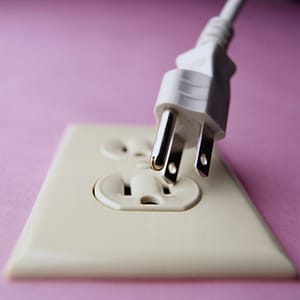
Understanding net metering could change how you use electricity in your home.
Net metering, also sometimes called net energy metering, is when your grid-connected solar energy system produces more energy than your home is using at that moment, so that energy flows out into the power grid. In most homes, this happens during the day when solar energy is at its peak but most appliances are off, then later in the evening the home draws from the grid to power things after the sun has set. This difference between what you send out to the grid and what you draw from the grid is your net energy difference. This net energy give and take is tracked by your power meter, hence the name, net metering.
How does it work?
When your system is generating energy, that energy first goes to powering your current energy needs: your fridge and freezer, lights that are on, the AC that’s running, or any other appliances. In areas that support net metering (currently 38 states, DC, and 4 territories), any energy that is not used as it is generated is sent out to the grid. Your solar system installation will likely have to include a new meter that spins and tracks in both directions to monitor this. Later in the day or in the evening, when the sun is no longer powering your system, your energy needs will be supplied by the grid. At the end of the month, you may receive a credit from your energy supplier if you’ve fed more energy into the grid than you’ve taken back out.
What are the benefits?
While solar clearly saves you money on energy bills by supplying some of your energy needs, the left over energy has to be captured somehow to be useful. This could be in the form of batteries that you draw from at night, or through net metering that tracks your overage and balances it against later energy use. Net metering is an easy alternative to expensive batteries that need maintenance and upkeep. For the community, supplying solar energy into the grid helps reduce strain in the systems so they run more smoothly for longer. Finally, everyone benefits when we reduce our carbon foot prints by adoption clean energy solutions.
What about batteries?
If you have net metering, you probably don’t need to invest in batteries, since the grid actually houses your extra energy for you. In the event of a natural disaster, the battery storage would be beneficial, but that may not be enough to cancel out the upfront cost and the necessary upkeep, especially when you’re already investing in a potentially very expensive system.
Contact JC Solar Today!
If you have any solar needs in Maryland, contact JC Solar, LLC. at 443-204-6551 or by email at eric@jcsolarroofing.com. Our solar powered products will help make your life easy, environmentally safe, and cost efficient! We’re conveniently located in Marriottsville, Maryland and proudly serve all of Maryland as well as Virginia, Pennsylvania, Washington DC and Arizona. Contact us today!
For updates and useful information, connect with us on Facebook, Twitter, Pinterest, or LinkedIn. You can also follow our blog to learn more!
Net metering, also sometimes called net energy metering, is when your grid-connected solar energy system produces more energy than your home is using at that moment, so that energy flows out into the power grid. In most homes, this happens during the day when solar energy is at its peak but most appliances are off, then later in the evening the home draws from the grid to power things after the sun has set. This difference between what you send out to the grid and what you draw from the grid is your net energy difference. This net energy give and take is tracked by your power meter, hence the name, net metering.
